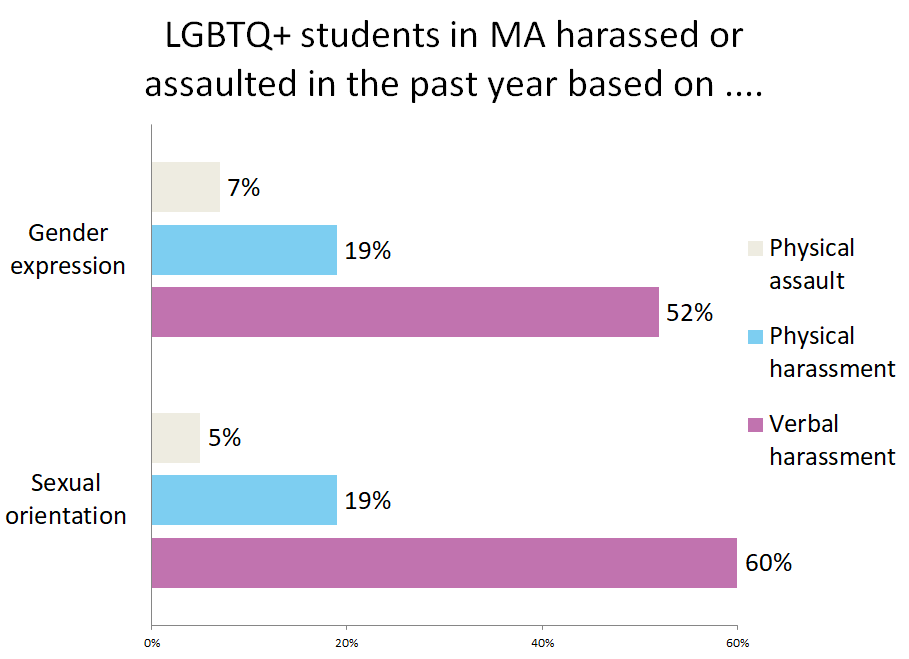The vast majority of LGBTQ+ youth in MA learn nothing at all about how to stay safe and healthy as LGBTQ+ people in their schools' sexual education classes. It's no wonder that LGBTQ+ teens experience more adverse sexual health outcomes than their peers. As long as we refuse to recognize the problem, we will continue to fail our LGBTQ youth. That's why the Massachusetts state legislature needs to restore the requirement that schools that offer sex ed courses must include LGBTQ+ information in their curriculum to S2399, An Act Relative to Healthy Youth. Parents, educators, students, and advocates all agree: it's time for inclusive sex ed now.

5 of every 6 LGBTQ+ students in MA learn nothing about LGBTQ+ health in their school's sex ed classes
In its previous incarnation, the act was supposed to ensure that Massachusetts schools that offer sex ed courses teach a medically-accurate curriculum that features age-appropriate information about gender identity and sexual orientation. These opt-out sexual education courses were required to include affirmative recognition that people have different sexual orientations, gender identities, and gender expressions, and provide information about resources for LGBTQ students. Further, health class teachers were supposed to teach their students relationship and communication skills that would let them make healthy decisions and form respectful relationships free of violence, coercion, and intimidation. While the act was stripped of some of its critical language in late 2019, we are optimistic that lawmakers will pass a version of the bill that ensures equitable access to important educational content for all students this year.
We need to make sure our schools are giving all students the tools they need to stay safe. From lowering the incidence of risky sexual behaviors to promoting tolerant, inclusive school cultures that decrease rates of bullying, the evidence is clear that inclusive sexual health education is the best way to protect our children. Click here to learn how you can support the effort to pass an inclusive version of the Healthy Youth Act or continue down the page to learn more about the state of LGBTQ+ sexual health education in Massachusetts.
– High school student, Greater Boston
of LGBTQ+ high school students in MA do not learn about LGBTQ+ sexual health in their school health classes
of gay, lesbian, and bisexual students who learned anything at all about GLB sexual health in their school health were taught negative, stigmatizing information about GLB people
of transgender and gender non-conforming students who learned anything at all about trans/GNC sexual health in their school health were taught negative, stigmatizing information about trans/GNC people
of gay, lesbian, and bisexual high school students in MA were never even taught how to use a condom in school
sources: MA DOE's 2015 Report on Health and Risk Behaviors of Massachusetts Youth; GLSEN's 2017 National School Climate Survey and School Climate Survey: MA State Snapshot
Right now in Massachusetts, our youth are experiencing a dangerous health crisis. In the last decade, the numbers of chlamydia and gonorrhea cases reported in Massachusetts have both increased by over 50% - with the bulk of cases reported among young people. Although they represent only a quarter of people having sex, young people ages 15 to 24 reported roughly two-thirds of chlamydia cases and almost half of gonorrhea cases in Massachusetts in 2015.
We know that such health issues tend to hit LGBTQ+ students hardest. At present, LGBTQ students are far less likely than their peers to report finding sex ed at their school useful - and far more likely to experience adverse sexual health outcomes, such as STIs, intimate partner violence, and sexual assault. Nationwide, the CDC has found that LGBTQ youth are more likely to engage in sexual risk behaviors such as early sexual contact, having sex without a condom, and consuming alcohol or drugs before sex, and state-level data indicates that many of these same trends hold true in MA. When 82% of LGBTQ+ students in our state report that their schools' health classes did not cover the tools and information that they need to stay safe and healthy, we have to face the reality that we are simply failing these teens. At best, most LGBTQ+ youth can expect health classes that teach them irrelevant information about the health risks or body parts involved in sex and overlook forms of protection they deserve to know about. At worst, these students are often taught misleading, stigmatizing information about LGBTQ+ issues that can negatively impact their health.
That's why we're proud to be part of a diverse local coalition of educators, researchers, and advocates, who support the bill, including (but not limited to):
- Planned Parenthood Advocacy Fund of Massachusetts
- Jane Doe Inc.
- NARAL Pro-Choice Massachusetts
- Boston Area Rape Crisis Center
- MassNOW
- the Every Voice Coalition
- the Massachusetts Teachers Association
– High school student, Massachusetts GSA Leadership Council
of gay, lesbian, and bisexual high school students in MA have experienced sexual contact against their will
of gay, lesbian, and bisexual high school students in MA have experienced physical dating violence in the past year
of gay, lesbian, and bisexual high school students in MA have experienced sexual dating violence in the past year
sources: MA DOE's 2015 Report on Health and Risk Behaviors of Massachusetts Youth
Text box about dating violence and why orgs from PPLM to NOW have endorsed this bill consent etc
teaching them about affirmative and voluntary consent and about recognizing and preventing dating violence
– High school student, Massachusetts GSA Leadership Council
of gay, lesbian, and bisexual high school students in MA attempted suicide in the past year

of gay, lesbian, and bisexual high school students in MA skipped school in the last month because they felt unsafe
sources: MA DOE's 2015 Report on Health and Risk Behaviors of Massachusetts Youth; GLSEN's 2017 School Climate Survey: MA State Snapshot
Text box about sex ed reducing rate of bullying
– Member at Large, Melrose School Committee
At MassEquality, we're proud to be part of the coalition lobbying to pass an inclusive version of the Healthy Youth Act. Our organization has a long and proud history of successfully advocating for LGBTQ+ youth in Massachusetts. With the support of our amazing volunteers and donors, our courageous coalition partners, and political leaders who championed LGBTQ+ equality, we played a leading role in driving anti-bullying legislation in 2014 and in banning conversion therapy in 2019. But we can't continue to bring the fight to MA without your support. From testifying in support of the Healthy Youth Act to calling legislators to organizing public awareness drives, we need your help to keep defending LGBTQ+ youth. Sign up below to volunteer in support of the Healthy Youth Act in the coming months, or click here to donate to our organization.
– Massachusetts State Representative Jack Lewis

